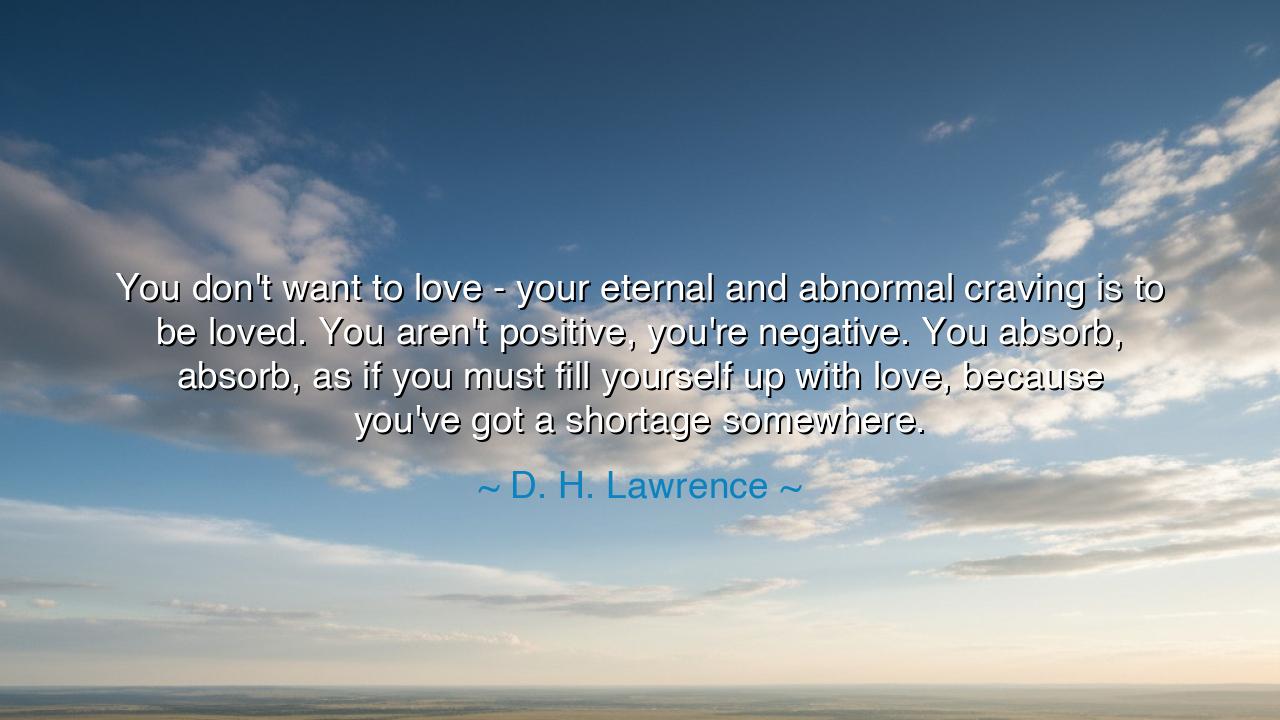
You don't want to love - your eternal and abnormal craving is to
You don't want to love - your eternal and abnormal craving is to be loved. You aren't positive, you're negative. You absorb, absorb, as if you must fill yourself up with love, because you've got a shortage somewhere.






"You don't want to love - your eternal and abnormal craving is to be loved. You aren't positive, you're negative. You absorb, absorb, as if you must fill yourself up with love, because you've got a shortage somewhere." These words, spoken by the evocative and perceptive D.H. Lawrence, strike at the very heart of a truth that many overlook in their understanding of love. The essence of Lawrence's words is a deep reflection on the nature of love not as an act of giving, but as a desperate need to receive. It speaks to the craving that some individuals experience, not the generosity of love that nourishes others, but the consuming desire to fill an inner void. Lawrence suggests that this longing is not a sign of love’s purity, but a sign of lack—a hunger for something that cannot be satiated merely by receiving.
In the ancient wisdom of the Greeks, there was a recognition that love has many forms. There was Eros, the passionate and often all-consuming love, and Philia, the love of deep friendship. But there was also agape, the love of selflessness and care for others. The first two, though powerful, often come from places of desire—desire for union, connection, and intimacy. But agape is different. It is self-giving, not self-serving. When Lawrence speaks of an individual who is "negative" in love, he is pointing to a soul that is caught in need rather than generosity. This kind of love consumes rather than contributes, drawing from others what it is unable to create within itself.
There are many who, in their desperate search for fulfillment, may believe that love is something that is bestowed upon them. They seek to absorb the affection of others without recognizing the importance of giving back. Their craving is not for mutual connection, but for the feeling of being filled—a deep, insatiable hunger that cannot be quenched by external affection alone. In the ancient world, the myth of Narcissus illustrates this idea perfectly. Narcissus, obsessed with his own reflection, fell in love with an image of himself, unable to recognize that true love requires more than self-reflection. He could not give love to others, for he was too consumed by his own need. His story is a tragic reminder that love must be a balance of giving and receiving, not a one-sided craving that only leads to self-destruction.
Let us look to Napoleon Bonaparte, whose obsession with power often mirrored his longing for admiration and love from others. Despite his success in conquering nations, Napoleon's need for validation was profound. He sought to fill his internal emptiness with the adoration of the masses and the affection of those closest to him. Yet, like Narcissus, he found that no amount of external praise could fill the void within. His relationships were marked by his deep insecurities and a constant need for affirmation, leaving him unable to truly give love to others in return. Josephine, his first wife, was often a target of his desire for love, yet it was clear that he could not provide her with the deep emotional connection she craved, for his love was consumed by his own insatiable need.
The origin of Lawrence's quote lies in his understanding of human nature, particularly the complexities of love and desire. He does not condemn love but calls attention to the imbalance that can occur when one becomes too focused on being loved. True love—the kind that creates deep, lasting bonds—is not rooted in a need to fill oneself but in the ability to give, to support, and to nurture. When we love with a healthy heart, we give love freely, and in return, we receive love that strengthens and enriches us. But when we crave love from others to the point of exhaustion, we set ourselves on a path of emotional starvation, one that leaves us empty and dissatisfied.
The lesson we must learn from Lawrence's words is one of balance. Love is not merely about receiving—it is about finding a way to give freely, to be both the giver and the receiver. We must ask ourselves: Do we seek to love, or do we seek to be loved? Do we nourish others with our care, or do we depend upon them to fill a void in our hearts? True love arises from an internal sense of wholeness, where we are able to give freely without the expectation of return. When we focus only on receiving, we fail to build the meaningful relationships that sustain us.
In your own life, consider this: What is the nature of your relationships? Do they reflect mutual love, or is there a sense of one-sidedness? Take a moment to reflect on whether you are seeking love in a way that is selfish or selfless. To love others, you must first be able to love yourself, not by absorbing love like a void, but by nurturing your own heart, by becoming whole within yourself. Only then can you truly give to others in a way that is enriching, sustainable, and fulfilling. For love is not a craving that consumes—it is a force that nourishes and uplifts, one that must be shared, not hoarded.






AAdministratorAdministrator
Welcome, honored guests. Please leave a comment, we will respond soon